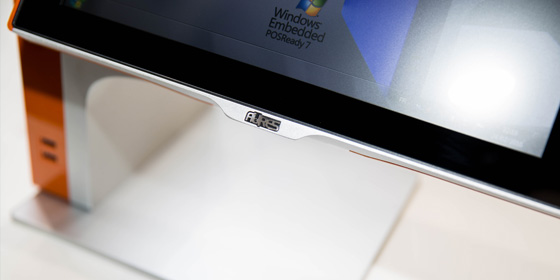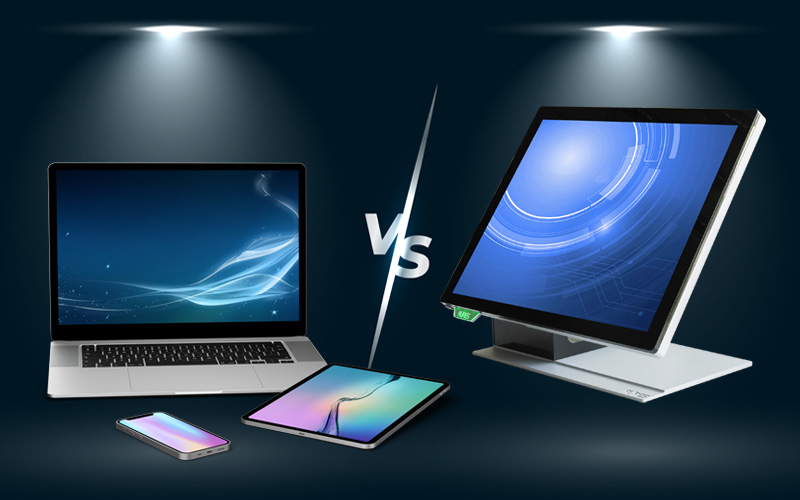Why deploying ‘professional’ POS systems at the point of sale … rather than ‘consumer’ IT equipment
The global market for point-of-sale terminals and systems (POS systems and other devices) has become very crowded. For several years now, the emergence of digitalization and omni-channel in the world of Retail has changed the game; the stakes linked to the choice of hardware have become less important in appearance than those linked to Software, Middleware and other applications – which now seem to take centre stage and give rise to an endless multiplication of new players.
In the past, a handful of manufacturers dominated the development, production and supply of point-of-sale IT systems and their associated peripherals; today, in all vertical sectors and sub-sectors of the retail industry, hundreds of suppliers offer complete solutions tailored to the needs of increasingly sophisticated operations.
In this relatively congested space, we are increasingly seeing new entrants to the POS market, some from the world of e-commerce and digital payments; companies like Shopify, for example, have jumped on the entrepreneurial trend by offering a point-of-sale solution that includes the supply of a POS terminal. The digital bank Revolut has also acquired Nobly, an application that enables an iPad to be used as a point-of-sale system. The same goes for Cashpad and other manufacturers that (supposedly) transform a consumer tablet into a genuine POS system…
Competition is always interesting. It encourages innovation, novelty and the improvement of certain services. The traditional players and companies in the POS market in the broadest sense can no longer rest on their laurels, while new entrants bring fresh ideas that shake up the status quo.
Even though the digital, mobile and omni-channel revolution has enabled the POS sector to take giant strides forward, we try at AURES to remain true to our founding principles: In a shop, restaurant, bar, hotel or any other point of sale or service where sales are managed, the choice of IT equipment remains an essential parameter; choosing high-performance and reliable professional POS equipment (POS systems, tablets, interactive kiosks, etc.) is often preferable than acquiring consumer type equipment.
On the other hand, some people believe that certain points of sale (small shops, for example) can do without professional POS management and checkout solutions.
The fact that a lot of POS software can nowadays run on any type of hardware may lead some people to prefer not to use dedicated hardware… and to try and save money in the short term.
On the contrary, we believe at AURES that this is not a good solution and we will try to explain why.
Reliability and Durability of Equipment
Professional POS systems are designed to withstand the demands of continuous use in a business environment. They perform better, last longer and are more reliable than consumer products, which are ill-suited to the requirements of a busy business in an often difficult environment (permanent exposure to shocks, dust, grease residues and liquid splashes of all kinds, which can be very common in sectors such as catering, food service, textile shops, etc.).
The smooth running and monitoring of in-store sales operations depend on the reliability of the point-of-sale system: anything that disrupts, slows down or interrupts the process (breakdowns, interruptions, etc.) will lead to loss of earnings and reduced sales; not to mention customer discontent with waiting times… ultimately leading to a drop in footfall and increased concerns about customer satisfaction and loyalty.
The robustness of point-of-sale equipment is a key argument. How many hours a day will your POS need to operate? How many transactions will be carried out, how many hands and fingers will be resting on your touch screens? How many drinks will be spilt in the wrong place?
If you decide to equip your employees with non-professional mobile POS tablets, there is often a risk that they will drop them and they will quickly become obsolete! We’ll come back to this point in a later post.
At AURES, we equip all our products with dust- and splash-proof PCAP touch screens. Guaranteed for tens of thousands of hours, insensitive to scratches, shocks and possible drops, these screens are protected by ultra-resistant hermetic cases that are not affected by humidity and do not allow liquids to infiltrate. The same goes for our Mobile POS (AURES ruggedised professional tablets), which are fitted with protective shells designed for tough jobs.
IT Security and Compliance
Retail transactions involve handling a large amount of sensitive customer information and payment data. Only professional POS systems can guarantee total security for functions such as data encryption, payment processing, confidentiality and compliance with industry standards in each country concerned, etc.
Meeting legal and regulatory requirements and guaranteeing the security of customer data is crucial for Retail companies; only professional POS systems are designed to take account of these specific considerations and constraints, which differ from one business to another and from one region to another.
Customisation and Scalability
Professional POS systems offer extensive customisation options. They can be adapted according to vertical sectors, the size of the point(s) of sale – and the specific flow of ongoing projects.
As a retailer grows, professional POS systems can generally adapt seamlessly to increased transaction volumes, the opening of new sites (shops) and the expansion of product catalogues.
All AURES’ ranges of POS and KIOSK solutions are scalable over time (replacement of motherboards, upgrading of processors and memory, addition of peripherals and complementary accessories at the checkout, replacement of touch screens, etc.).
Rich Functionalities
Professional point-of-sale solutions and terminals are generally fitted with a full range of features to meet the most specific and demanding needs of today’s retailers.
Consumer products may lack some of the advanced features needed to streamline and rationalise certain business operations (support for CRM, multilingualism, multiple reporting tools, centralised data management, loyalty operations, dynamic checkout displays, etc.).
Some non-professional PCs and tablets can also often have less storage space than a dedicated POS, which can be a disadvantage if you have large databases to maintain.
Similarly, some tablet functionalities, such as access to cloud-based applications (SAAS software), require a reliable internet connection, which is not always the case at all points of sale – where professional POS devices are preferable.
Integration Capabilities
Professional hardware and POS solutions enable easy, seamless integration of all kinds of tools, software platforms and business systems, e.g. accounting software, e-commerce platforms, customer relationship management (CRM) platforms, etc. This ease of integration streamlines business processes while reducing the number of tiresome manual operations (data entry, back-ups, etc.).
Consumer products may lack the necessary integration options, making it difficult to create an efficient, interconnected, omni-channel business environment.
AURES POS and management equipment is validated and recognised by the major software and application publishers in the retail and POS world, which is absolutely not the case for consumer IT systems.
Specialist Support, Customised Services, Maintenance & Assistance
Not only are POS terminals designed to withstand intensive use, they also benefit from dedicated, specialist support from their manufacturers. If an iPad or standard PC you use in your shop has a problem or breaks down, technical support will probably be online and without personalised help; it’s up to you to identify the problem and then solve it! Most consumer equipment has limited – or no – support, which is not suitable for a shop or a store.
A manufacturer like AURES offers a comprehensive catalogue of technical services and support (hotline, after-sales service, customised maintenance with extended warranties on all products, training, etc.); with our technical teams and those of our partners, we are able to identify and resolve the majority of breakdowns or problems identified by our end customers as quickly as possible, remotely, at AURES or on site.
TCO and Long-Term Profitability
Although the initial cost of professional POS systems may be higher than that of consumer products, the TCO (Total Cost of Ownership) and long-term profitability can often be in favour of professional systems. They are much more robust, high-performance, scalable and reliable, and are designed to last much longer!
In short, professional POS solutions enable bespoke, scalable, feature-rich and reliable deployments that are perfectly suited to the demands of retail and omni-channel; some consumer hardware may be sufficient for small-scale or occasional use; but CIOs of retailers seeking efficiency, security and growth generally find that investment in professional POS systems is much better suited to their objectives.
Form and Function by AURES
At AURES, there’s another reason why we believe that dedicated, professional POS equipment remains the best option: over and above the criteria of performance, robustness and reliability, we have always paid particular attention to the ergonomics and design of our products, with the aim of harmoniously accompanying the identity, ambience and style of the retail outlet right through to the checkout area.




